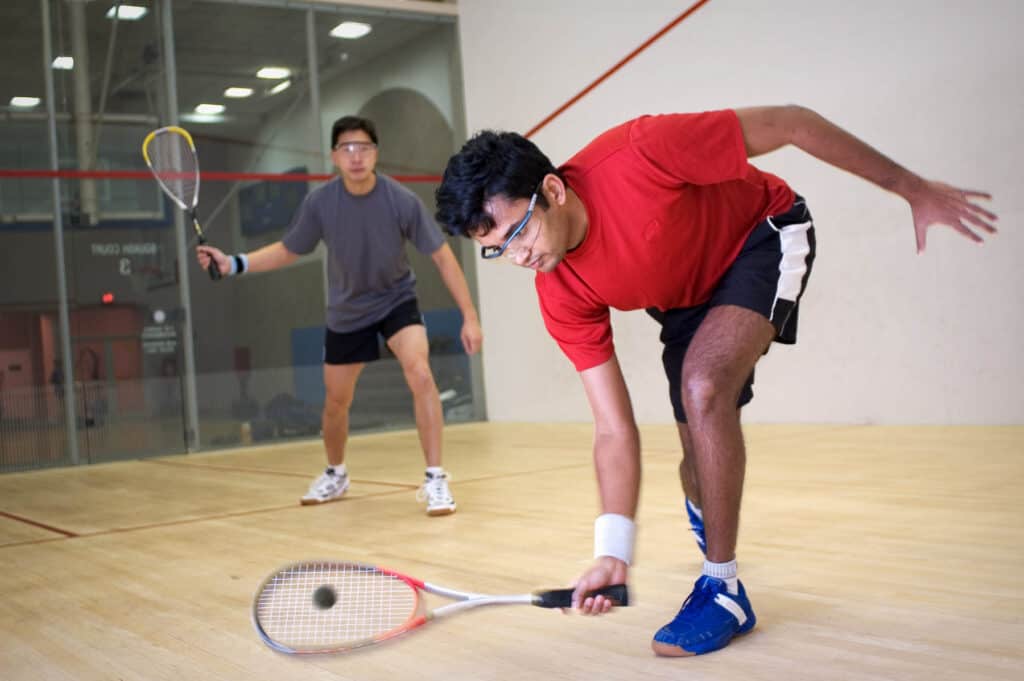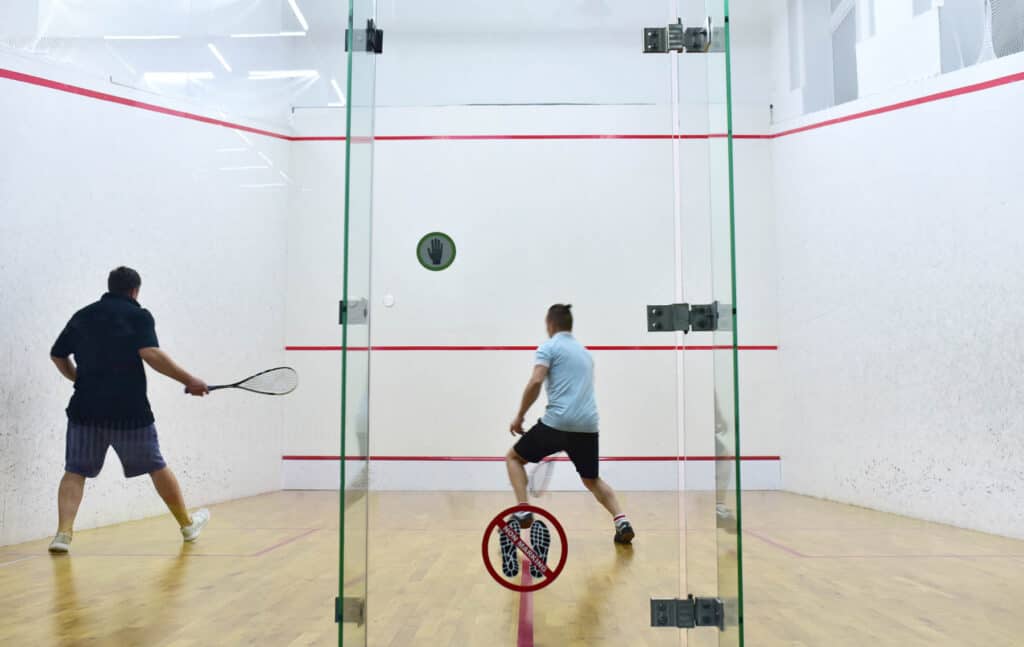I. Introduction
Squash is a racquet sport played in an enclosed court, where two players hit a small rubber ball against the walls, aiming to make the ball bounce twice on the floor before their opponent can hit it. It is a fast-paced and physically demanding sport that requires quick reflexes, agility, and endurance.
Squash tournaments are an essential part of the sport, as they provide an opportunity for players to compete against others and showcase their skills. Tournaments also serve as a platform for players to improve their rankings, earn points, and gain recognition in the squash community. Additionally, tournaments offer a chance for spectators to witness high-level squash matches and experience the excitement of the sport.
This article aims to provide a comprehensive guide for players who are interested in participating in squash tournaments. It will cover everything from preparing for a tournament to what to expect during the competition.

II. Squash Courts
Squash courts are enclosed playing areas made of various materials, such as wood, glass, or plaster. The court features four walls, a floor, and a tin, which is a metal strip running along the bottom of the front wall.
Squash courts are made from different materials. Full glass courts feature all four walls made from glass. Glass courts are used for professional tournaments and allow spectators to watch the matches from all angles.
Traditional courts are the most common type of squash courts worldwide and are used for both recreational and competitive play. These are made of plaster walls with many now featuring a full glass back wall.
Squash court dimensions: Length of court is 9.75m. Width of court is 6.4m. Diagonal is 11.665m. The standard tin height is 480mm however a lowered tin height of 430mm is preferred for all PSA sanctioned tournaments.
Squash court etiquette is an essential aspect of the sport, as it ensures fair play and safety for all players. Some important rules of squash court etiquette include letting your opponent retrieve the ball if they are in your way, avoiding excessive noise or movement, and refraining from hitting the ball before your opponent is ready.
III. Preparing for a Squash Tournament
A. Fitness and Conditioning
- Develop a training plan that includes strength, cardio, and flexibility exercises.
- Focus on exercises that target the muscles used in squash, such as the legs, core, and upper body.
- Incorporate interval training and plyometric exercises to improve speed and agility.
- Gradually increase the intensity and duration of your workouts leading up to the tournament.
B. Mental Preparation
- Develop a positive mindset by focusing on your strengths and past successes.
- Practice visualization and positive self-talk to build confidence and reduce anxiety.
- Set realistic goals for the tournament and focus on the process rather than the outcome.
- Develop a game plan and practice it during training sessions.
C. Equipment and Gear

- Choose a racquet that suits your playing style and skill level.
- Make sure the racquet is the correct weight and grip size for your hand.
- Have a spare racquet in case of string breakage or damage.
- Select shoes that provide good traction and support for quick movements.
- Ensure the shoes fit well and are comfortable for extended periods of play.
- Avoid using running shoes, as they may not provide enough support for the lateral movements in squash.
- Clothing
- Wear clothing that is comfortable and allows for a full range of motion.
- Choose lightweight, breathable materials that wick away sweat.
- Wear clothing appropriate for the tournament’s dress code.
D. Nutrition and Hydration
- Eat a balanced diet that includes carbohydrates, protein, and healthy fats.
- Stay hydrated by drinking plenty of water before, during, and after matches.
- Avoid consuming sugary or high-fat foods that can cause energy crashes.
- Consider using sports drinks or electrolyte supplements to replenish lost fluids and nutrients during play.
IV. What to Expect at a Squash Tournament
A. Tournament Format
- Single Elimination: Players are eliminated from the tournament after one loss.
- Round-Robin: Players are grouped into pools and play against everyone in their pool. The player with the most wins advances to the next round.
B. Tournament Schedule
- Check the tournament schedule ahead of time and plan accordingly.
- Be prepared to play multiple matches in a day.
- Allow time for warm-ups and cool-downs before and after matches.
C. Rules and Regulations
- Familiarize yourself with the tournament’s rules and regulations.
- Know the scoring system, service rules, and let rules.
- Understand the consequences of receiving warnings and penalties.
D. Referees and Officials
- Matches will be officiated by referees who enforce the rules.
- Players may request video reviews for controversial calls.
- Show respect towards referees and officials, even if you disagree with their calls.
E. Spectator Behavior
- Spectators should refrain from distracting or disrupting players during matches.
- Cheering is encouraged, but excessive noise or heckling is not.
- Respect the players’ focus and concentration by staying quiet during play.
V. Tips for Success at a Squash Tournament

A. Warm-up and Stretching
- Warm up for at least 10-15 minutes before each match to prevent injury.
- Incorporate dynamic stretching to increase blood flow to muscles.
- Practice specific drills to get your body and mind prepared for the match.
B. Game Strategies
- Stick to your game plan and play to your strengths.
- Adjust your strategy if necessary to counter your opponent’s strengths.
- Be aware of your opponent’s tendencies and adjust your play accordingly.
C. Sportsmanship and Respect
- Show respect towards your opponents, referees, and officials.
- Accept wins and losses with grace and dignity.
- Avoid unsportsmanlike behavior, such as arguing with calls or taunting opponents.
D. Recovery and Rest
- Properly cool down after matches to aid in recovery.
- Take breaks between matches to rest and refuel.
- Get adequate sleep and rest to ensure your body is in top condition for the tournament.
By following these tips and preparing accordingly, you can maximize your chances of success at a squash tournament. Remember to stay focused, be respectful, and enjoy the experience!
VI. Conclusion
A. Recap of Important Points
- Proper preparation is key to success in squash tournaments.
- Be familiar with the tournament format, schedule, rules, and regulations.
- Show respect towards opponents, referees, and officials.
- Take care of your body through proper nutrition, hydration, and rest.
B. Encouragement to Participate in Squash Tournaments
- Squash tournaments offer an opportunity to test your skills and improve as a player.
- They provide a chance to meet other players and build a sense of community within the sport.
- Participating in tournaments can be a fun and rewarding experience.
C. Final Thoughts
Squash is a challenging and exciting sport that can provide a lifetime of enjoyment. By following the tips outlined in this article, you can prepare yourself for success at squash tournaments and improve your overall game. Remember to always play with respect and sportsmanship, and most importantly, have fun!
